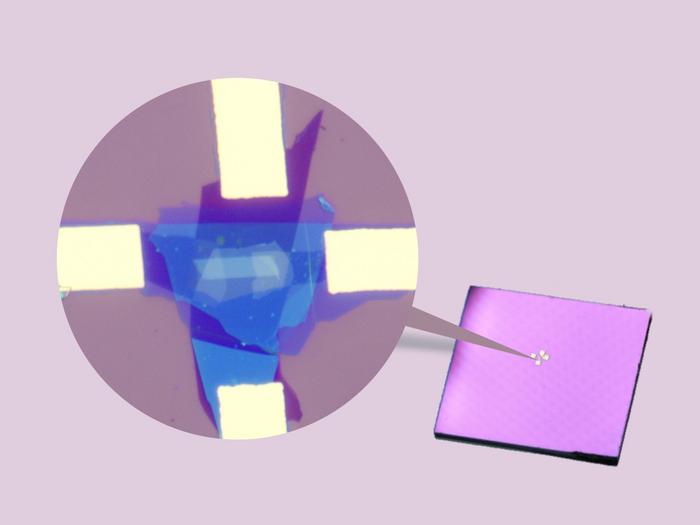Researchers at the Ningbo Institute of Materials Technology and Engineering (NIMTE) of the Chinese Academy of Sciences, in collaboration with research groups from the University of Electronic Science and Technology of China and Fudan University, have developed a fatigue-free ferroelectric material based on sliding ferroelectricity.

Credit: NIMTE
Researchers at the Ningbo Institute of Materials Technology and Engineering (NIMTE) of the Chinese Academy of Sciences, in collaboration with research groups from the University of Electronic Science and Technology of China and Fudan University, have developed a fatigue-free ferroelectric material based on sliding ferroelectricity.
The study was published in Science.
Ferroelectric materials have switchable spontaneous polarization that can be reversed by an external electric field, which have been widely applied to non-volatile memory, sensing, and energy conversion devices.
Due to the inherited ionic motion of ferroelectric switching, ferroelectric polarization fatigue inevitably occurs in conventional ferroelectric materials as the number of polarization reversal cycles increases. This can lead to performance degradation and device failure, thus limiting the practical applications of ferroelectric materials.
To solve this fatigue problem, the researchers developed a fatigue-free ferroelectric system based on sliding ferroelectricity. A bilayer 3R-MoS2 dual-gate device was fabricated using the chemical vapor transport method.
After 106 switching cycles with different pulse widths ranging from 1 ms to 100 ms, the ferroelectric polarization dipoles showed no loss, indicating that the device still retained its memory performance.
Compared with commercial ferroelectric devices, this device exhibits a superior total stress time of 105 s in an electric field, demonstrating its excellent endurance.
By means of a novel machine-learning potential model, theoretical calculations revealed that the fatigue-free property of sliding ferroelectricity can be attributed to its immobile charged defects.
This work provides an innovative solution to the problematic performance degradation of conventional ferroelectrics.
The study was supported by the National Natural Science Foundation of China and the Zhejiang Provincial Natural Science Foundation of China, among others.
Journal
Science
Method of Research
Experimental study
Subject of Research
Not applicable
Article Title
Developing fatigue-resistant ferroelectrics using interlayer sliding switching
Article Publication Date
6-Jun-2024



